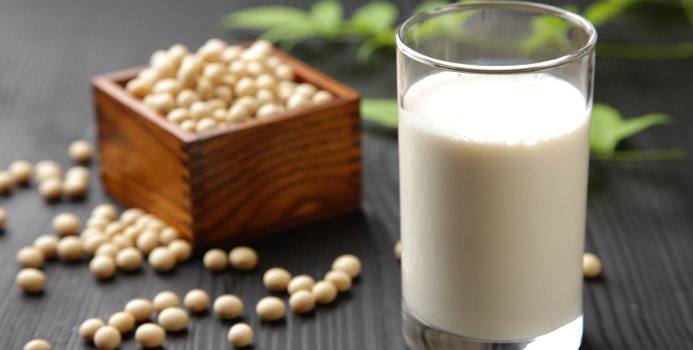Soy milk and rice milk are somewhat similar, but have some very distinct differences. Both of these milks are often fortified with essential vitamins and minerals that are present in cows' milk. However, benefits and potential drawbacks exist for both soy and rice milks.
Calorie Content
Rice milk is often slightly higher in calories than soy milk, but it depends on the brand and flavor you choose. Original rice milk generally contains about 120 calories per cup, while original soy milk provides just 80 to 100 calories in each cup. Light soy milk may contain just 50 calories per serving. So, if you're trying to cut calories, soy milk appears to be the better choice.
What About Protein?
If you're looking for a good source of dietary protein, choose soy milk over rice milk. Rice milk is low in protein, containing only about 1 gram per cup, but soy milk often provides 8 grams of protein per cup. Furthermore, soy milk contains all essential amino acids, so is a source of high-quality complete protein.
Protein helps you feel full for longer periods of time, aids in healthy weight management, and helps keep your metabolism high. Women need at least 46 grams of protein, pregnant and nursing women require 71 grams, and men need a minimum of 56 grams of protein daily, notes the Institute of Medicine. Athletes, older adults, people trying to lose weight, and individuals recovering from an injury benefit from additional protein.
Vitamins and Minerals
Most soy and rice milks are fortified with many of the same vitamins and minerals, in similar amounts, present in cows' milk. These include calcium, vitamin D, vitamin A, phosphorous, and vitamin B-12. So, if you're concerned about getting all of the essential micronutrients found in cow's milk, it doesn't really matter if you choose soy or rice milk.
The Best Option
Because of soy milk's higher protein content, it is generally the better choice over rice milk. Furthermore, the Linus Pauling Institute suggests that soy helps reduce cholesterol, may be beneficial for bone health, and might help reduce your risk for developing certain types of cancer. However, if you have a soy allergy or are concerned about the estrogen-like properties of isoflavones found in soy milk, rice or cow's milk may be a better option for you. Lactose-free cow's milk is another protein-rich option for people who are lactose intolerant but don't like the taste of soy milk.

An experienced health, nutrition and fitness writer, Erin Coleman is a registered and licensed dietitian and holds a dietetics degree from the University of Wisconsin-Madison. She also has worked as a clinical dietitian and health educator in outpatient settings. Erin's work is published on popular health websites, such as TheNest.com and JillianMichaels.com.



